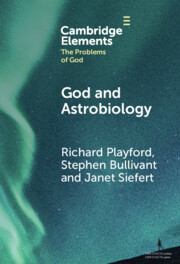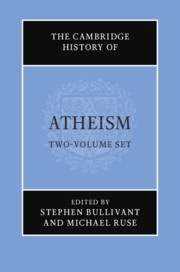29 results

God and Astrobiology
-
- Published online:
- 22 January 2024
- Print publication:
- 22 February 2024
-
- Element
- Export citation
Copyright page
-
- Book:
- The Cambridge History of Atheism
- Published online:
- 25 September 2021
- Print publication:
- 16 September 2021, pp iv-iv
-
- Chapter
- Export citation
Dedication
-
- Book:
- The Cambridge History of Atheism
- Published online:
- 25 September 2021
- Print publication:
- 16 September 2021, pp v-vi
-
- Chapter
- Export citation
Part VII - Lived Atheism in the Twentieth- and Twenty-First Centuries: Case-Studies
-
- Book:
- The Cambridge History of Atheism
- Published online:
- 25 September 2021
- Print publication:
- 16 September 2021, pp 761-1004
-
- Chapter
- Export citation
Part III - Reformation, Renaissance, Enlightenment
-
- Book:
- The Cambridge History of Atheism
- Published online:
- 25 September 2021
- Print publication:
- 16 September 2021, pp 181-326
-
- Chapter
- Export citation
Introduction
-
- Book:
- The Cambridge History of Atheism
- Published online:
- 25 September 2021
- Print publication:
- 16 September 2021, pp 1-8
-
- Chapter
- Export citation
Contributors
-
- Book:
- The Cambridge History of Atheism
- Published online:
- 25 September 2021
- Print publication:
- 16 September 2021, pp xiv-xxx
-
- Chapter
- Export citation
Part II - Atheisms in History
-
- Book:
- The Cambridge History of Atheism
- Published online:
- 25 September 2021
- Print publication:
- 16 September 2021, pp 63-180
-
- Chapter
- Export citation
Part I - Preliminaries
-
- Book:
- The Cambridge History of Atheism
- Published online:
- 25 September 2021
- Print publication:
- 16 September 2021, pp 9-62
-
- Chapter
- Export citation
Part IX - Conclusion
-
- Book:
- The Cambridge History of Atheism
- Published online:
- 25 September 2021
- Print publication:
- 16 September 2021, pp 1113-1122
-
- Chapter
- Export citation
Index
-
- Book:
- The Cambridge History of Atheism
- Published online:
- 25 September 2021
- Print publication:
- 16 September 2021, pp 1123-1166
-
- Chapter
- Export citation
Part V - Classical Modernity: Social and Political Currents
-
- Book:
- The Cambridge History of Atheism
- Published online:
- 25 September 2021
- Print publication:
- 16 September 2021, pp 423-582
-
- Chapter
- Export citation
Part VI - Twentieth and Twenty-First Centuries: Intellectual and Artistic Currents
-
- Book:
- The Cambridge History of Atheism
- Published online:
- 25 September 2021
- Print publication:
- 16 September 2021, pp 583-760
-
- Chapter
- Export citation
Acknowledgments
-
- Book:
- The Cambridge History of Atheism
- Published online:
- 25 September 2021
- Print publication:
- 16 September 2021, pp xiii-xiii
-
- Chapter
- Export citation
59 - Atheism Throughout the World
- from Part VIII - Emerging Atheisms in the Twenty-First Century
-
-
- Book:
- The Cambridge History of Atheism
- Published online:
- 25 September 2021
- Print publication:
- 16 September 2021, pp 1095-1112
-
- Chapter
- Export citation
Part IV - Classical Modernity: Philosophical and Scientific Currents
-
- Book:
- The Cambridge History of Atheism
- Published online:
- 25 September 2021
- Print publication:
- 16 September 2021, pp 327-422
-
- Chapter
- Export citation
Contents
-
- Book:
- The Cambridge History of Atheism
- Published online:
- 25 September 2021
- Print publication:
- 16 September 2021, pp vii-xii
-
- Chapter
- Export citation
Part VIII - Emerging Atheisms in the Twenty-First Century
-
- Book:
- The Cambridge History of Atheism
- Published online:
- 25 September 2021
- Print publication:
- 16 September 2021, pp 1005-1112
-
- Chapter
- Export citation

The Cambridge History of Atheism
-
- Published online:
- 25 September 2021
- Print publication:
- 16 September 2021
“We Confess that we are Atheists”
-
- Journal:
- New Blackfriars / Volume 101 / Issue 1092 / March 2020
- Published online by Cambridge University Press:
- 01 January 2024, pp. 120-134
- Print publication:
- March 2020
-
- Article
- Export citation



